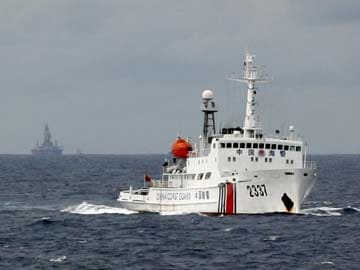
A Chinese Coast Guard vessel (R) passes near the Chinese oil rig, Haiyang Shi You 981 (L) in the South China Sea, about 210 km (130 miles) from the coast of Vietnam June 13, 2014.
The Philippines said Monday it has won support from Vietnam, Indonesia and Brunei for a plan to ease tensions in the South China Sea which it intends to present at a regional meeting this week.
China and several of its Southeast Asian neighbours are embroiled in increasingly bitter territorial disputes over the strategic sea which Beijing claims almost in its entirety.
Manila's plan calls for an immediate moratorium on activities which escalate tensions and implementation of a code of conduct in the sea, which is home to vital shipping routes and is believed to sit atop vast oil and gas deposits.
The plan, to be presented to an Association of Southeast Asian Nations (ASEAN) meeting in Myanmar this week, was raised during Foreign Secretary Albert del Rosario's recent visits to Brunei, Vietnam and Indonesia, department spokesman Charles Jose said.
"He has taken trips (to these countries) precisely to raise the triple action plan and so far, all of these countries have expressed support for the initiative," Jose told reporters.
He said del Rosario and other Filipino delegates would try to raise the initiative at the various ASEAN discussions.
ASEAN includes the Philippines as well as Brunei, Cambodia, Indonesia, Laos, Malaysia, Myanmar, Singapore, Thailand and Vietnam.
The Philippines, Brunei, Malaysia and Vietnam along with non-members China and Taiwan, have conflicting claims to parts or all of the South China Sea.
Tensions have risen in recent years as China has become more aggressive in enforcing its claims. Beijing's deployment of an oil rig in contested waters in May triggered anti-Chinese riots in Vietnam and sent relations plummeting.
Manila's plan includes a call for implementation of a 2002 ASEAN-China Declaration of Conduct in the South China Sea and will also seek a settlement mechanism anchored on international law to resolve the disputes.
The Myanmar meetings will also involve talks between the ASEAN foreign ministers and counterparts from the bloc's main regional trading partners -- China, Japan and South Korea.
There will also be a regional security dialogue involving 27 countries, including the ASEAN members, China, Japan, South Korea, the United States, Russia, and Australia.
China and several of its Southeast Asian neighbours are embroiled in increasingly bitter territorial disputes over the strategic sea which Beijing claims almost in its entirety.
Manila's plan calls for an immediate moratorium on activities which escalate tensions and implementation of a code of conduct in the sea, which is home to vital shipping routes and is believed to sit atop vast oil and gas deposits.
The plan, to be presented to an Association of Southeast Asian Nations (ASEAN) meeting in Myanmar this week, was raised during Foreign Secretary Albert del Rosario's recent visits to Brunei, Vietnam and Indonesia, department spokesman Charles Jose said.
"He has taken trips (to these countries) precisely to raise the triple action plan and so far, all of these countries have expressed support for the initiative," Jose told reporters.
He said del Rosario and other Filipino delegates would try to raise the initiative at the various ASEAN discussions.
ASEAN includes the Philippines as well as Brunei, Cambodia, Indonesia, Laos, Malaysia, Myanmar, Singapore, Thailand and Vietnam.
The Philippines, Brunei, Malaysia and Vietnam along with non-members China and Taiwan, have conflicting claims to parts or all of the South China Sea.
Tensions have risen in recent years as China has become more aggressive in enforcing its claims. Beijing's deployment of an oil rig in contested waters in May triggered anti-Chinese riots in Vietnam and sent relations plummeting.
Manila's plan includes a call for implementation of a 2002 ASEAN-China Declaration of Conduct in the South China Sea and will also seek a settlement mechanism anchored on international law to resolve the disputes.
The Myanmar meetings will also involve talks between the ASEAN foreign ministers and counterparts from the bloc's main regional trading partners -- China, Japan and South Korea.
There will also be a regional security dialogue involving 27 countries, including the ASEAN members, China, Japan, South Korea, the United States, Russia, and Australia.
Track Latest News Live on NDTV.com and get news updates from India and around the world

